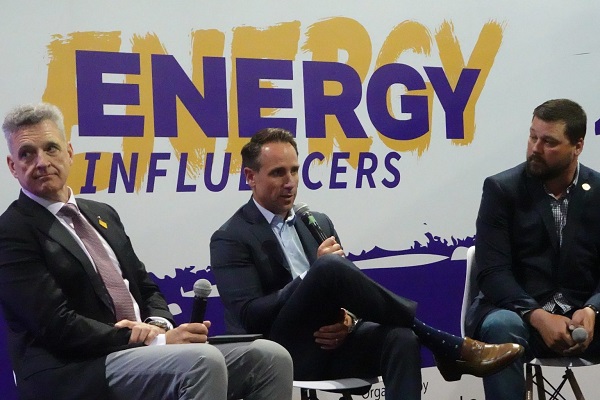Uncategorized
US: Trump lawyer met Russian who offered ‘political synergy’
WASHINGTON — President Donald Trump’s former lawyer, Michael Cohen, was in touch as far back as 2015 with a Russian who offered “political synergy” with the Trump election campaign and proposed a meeting between the candidate and Russian President Vladimir Putin, the federal special counsel said.
Court filings from prosecutors in New York and special counsel Robert Mueller’s office Friday laid out previously undisclosed contacts between Trump associates and Russian intermediaries and suggested the Kremlin aimed early on to influence Trump and his campaign by playing to both his political aspirations and his personal business interests.
The filings, in cases involving Cohen and former campaign chairman Paul Manafort , capped a dramatic week of revelations in Mueller’s probe into possible
They make clear how witnesses previously close to Trump — Cohen once declared he’d “take a bullet” for the president — have since provided damaging information about him in efforts to come clean to the government and in some cases get lighter prison sentences.
One defendant, former national security adviser Michael Flynn, provided so much information to prosecutors that Mueller this week said he shouldn’t serve any prison time.
In hours of interviews with prosecutors, witnesses have offered up information about pivotal episodes under examination, including possible collusion with Russia and payments during the campaign to silence a porn star and Playboy model who said they had sex with Trump a decade earlier.
In one of the filings, Mueller details how Cohen spoke to a Russian who “claimed to be a ‘trusted person’ in the Russian Federation who could offer the campaign ‘political synergy’ and ‘synergy on a government level.'”
The person repeatedly dangled a meeting between Trump and Putin, saying such a meeting could have a “phenomenal” impact “not only in political but in a business dimension as well.”
That was a reference to a proposed Moscow real estate deal that prosecutors say could have netted Trump’s business hundreds of millions of dollars. Cohen admitted last week to lying to Congress by saying discussions about a Trump Tower in Moscow ended in January 2016 when in fact they stretched into that June, well into the U.S. campaign.
Cohen told prosecutors he never followed up on the Putin invitation, though the offer bore echoes of a March 2016 proposal presented by Trump campaign aide George Papadopoulos, who broached to other advisers the idea of a Putin encounter.
Prosecutors said probation officials recommended a sentence for Cohen of three-and-a-half years in prison. His lawyers want the 52-year-old attorney to avoid prison time altogether.
In an additional filing Friday evening, prosecutors said Manafort lied about his contacts with a Russian associate and Trump administration officials, including in 2018.
The court papers say Manafort initially told prosecutors he didn’t have contact with any people while they were in the Trump administration. But prosecutors say they recovered “electronic documents” showing contacts with multiple administration officials not identified in the filings.
Manafort, who has pleaded guilty to several counts, violated his plea agreement by telling “multiple discernible lies” to prosecutors, they said.
Manafort resigned from his job on the Trump campaign as questions swirled about his lobbying work for a pro-Russia political party in Ukraine.
Prosecutors in Cohen’s case said that even though he
“After cheating the IRS for years, lying to banks and to Congress, and seeking to criminally influence the Presidential election, Cohen’s decision to plead guilty – rather than seek a pardon for his manifold crimes – does not make him a hero,” they wrote.
Cohen, dubbed Trump’s “legal fixer” in the past, also described his work in conjunction with Trump in orchestrating hush money payments to two women — adult actress Stormy Daniels and Playboy model Karen McDougal — who said they had sex with Trump.
Prosecutors in New York, where Cohen pleaded guilty in August to campaign finance crimes in connection with those payments, said the lawyer “acted in
Federal law requires that any payments made “for the purposes of influencing” an election must be reported in campaign finance disclosures. The court filing Friday makes clear that the payments were made to benefit Trump politically.
Trump tried to brush off Friday’s revelations, claiming wrongly on Twitter that the news “Totally clears the President. Thank you!”
A court filing also reveals that Cohen told prosecutors he and Trump discussed a potential meeting with Putin on the sidelines of the U.N. General Assembly in 2015, shortly after Trump announced his candidacy for president. In a footnote Mueller’s team writes that Cohen conferred with Trump “about contacting the Russia government before reaching out to gauge Russia’s interest in such a meeting.” It never took place.
___
Associated Press writers Larry Neumeister in New York and Michael Balsamo in Washington contributed to this report
Eric Tucker, Chad Day And Jim Mustian, The Associated Press
Uncategorized
Kananaskis G7 meeting the right setting for U.S. and Canada to reassert energy ties


Energy security, resilience and affordability have long been protected by a continentally integrated energy sector.
The G7 summit in Kananaskis, Alberta, offers a key platform to reassert how North American energy cooperation has made the U.S. and Canada stronger, according to a joint statement from The Heritage Foundation, the foremost American conservative think tank, and MEI, a pan-Canadian research and educational policy organization.
“Energy cooperation between Canada, Mexico and the United States is vital for the Western World’s energy security,” says Diana Furchtgott-Roth, director of the Center for Energy, Climate and Environment and the Herbert and Joyce Morgan Fellow at the Heritage Foundation, and one of America’s most prominent energy experts. “Both President Trump and Prime Minister Carney share energy as a key priority for their respective administrations.
She added, “The G7 should embrace energy abundance by cooperating and committing to a rapid expansion of energy infrastructure. Members should commit to streamlined permitting, including a one-stop shop permitting and environmental review process, to unleash the capital investment necessary to make energy abundance a reality.”
North America’s energy industry is continentally integrated, benefitting from a blend of U.S. light crude oil and Mexican and Canadian heavy crude oil that keeps the continent’s refineries running smoothly.
Each day, Canada exports 2.8 million barrels of oil to the United States.
These get refined into gasoline, diesel and other higher value-added products that furnish the U.S. market with reliable and affordable energy, as well as exported to other countries, including some 780,000 barrels per day of finished products that get exported to Canada and 1.08 million barrels per day to Mexico.
A similar situation occurs with natural gas, where Canada ships 8.7 billion cubic feet of natural gas per day to the United States through a continental network of pipelines.
This gets consumed by U.S. households, as well as transformed into liquefied natural gas products, of which the United States exports 11.5 billion cubic feet per day, mostly from ports in Louisiana, Texas and Maryland.
“The abundance and complementarity of Canada and the United States’ energy resources have made both nations more prosperous and more secure in their supply,” says Daniel Dufort, president and CEO of the MEI. “Both countries stand to reduce dependence on Chinese and Russian energy by expanding their pipeline networks – the United States to the East and Canada to the West – to supply their European and Asian allies in an increasingly turbulent world.”
Under this scenario, Europe would buy more high-value light oil from the U.S., whose domestic needs would be back-stopped by lower-priced heavy oil imports from Canada, whereas Asia would consume more LNG from Canada, diminishing China and Russia’s economic and strategic leverage over it.
* * *
The MEI is an independent public policy think tank with offices in Montreal, Ottawa, and Calgary. Through its publications, media appearances, and advisory services to policymakers, the MEI stimulates public policy debate and reforms based on sound economics and entrepreneurship.
As the nation’s largest, most broadly supported conservative research and educational institution, The Heritage Foundation has been leading the American conservative movement since our founding in 1973. The Heritage Foundation reaches more than 10 million members, advocates, and concerned Americans every day with information on critical issues facing America.
Uncategorized
Poilievre on 2025 Election Interference – Carney sill hasn’t fired Liberal MP in Chinese election interference scandal

From Conservative Party Communications
“Yes. He must be disqualified. I find it incredible that Mark Carney would allow someone to run for his party that called for a Canadian citizen to be handed over to a foreign government on a bounty, a foreign government that would almost certainly execute that Canadian citizen.
“Think about that for a second. We have a Liberal MP saying that a Canadian citizen should be handed over to a foreign dictatorship to get a bounty so that that citizen could be murdered. And Mark Carney says he should stay on as a candidate. What does that say about whether Mark Carney would protect Canadians?
“Mark Carney is deeply conflicted. Just in November, he went to Beijing and secured a quarter-billion-dollar loan for his company from a state-owned Chinese bank. He’s deeply compromised, and he will never stand up for Canada against any foreign regime. It is another reason why Mr. Carney must show us all his assets, all the money he owes, all the money that his companies owe to foreign hostile regimes. And this story might not be entirely the story of the bounty, and a Liberal MP calling for a Canadian to be handed over for execution to a foreign government might not be something that the everyday Canadian can relate to because it’s so outrageous. But I ask you this, if Mark Carney would allow his Liberal MP to make a comment like this, when would he ever protect Canada or Canadians against foreign hostility?
“He has never put Canada first, and that’s why we cannot have a fourth Liberal term. After the Lost Liberal Decade, our country is a playground for foreign interference. Our economy is weaker than ever before. Our people more divided. We need a change to put Canada first with a new government that will stand up for the security and economy of our citizens and take back control of our destiny. Let’s bring it home.”
-

 conflict2 days ago
conflict2 days agoTrump dismisses US intelligence that Iran wasn’t pursuing nuclear bomb before Israeli attack
-

 Censorship Industrial Complex2 days ago
Censorship Industrial Complex2 days agoJordan Peterson reveals DEI ‘expert’ serving as his ‘re-education coach’ for opposing LGBT agenda
-

 Energy21 hours ago
Energy21 hours agoWho put the energy illiterate in charge?
-

 espionage21 hours ago
espionage21 hours agoFBI Buried ‘Warning’ Intel on CCP Plot to Elect Biden Using TikTok, Fake IDs, CCP Sympathizers and PRC Students—Grassley Probes Withdrawal
-

 Business2 days ago
Business2 days agoCanada’s critical minerals are key to negotiating with Trump
-

 Alberta1 day ago
Alberta1 day agoAlberta’s carbon diet – how to lose megatonnes in just three short decades
-

 espionage23 hours ago
espionage23 hours agoFrom Sidewinder to P.E.I.: Are Canada’s Political Elites Benefiting from Beijing’s Real Estate Reach?
-

 International2 days ago
International2 days agoTrump puts new price tag on Canada joining “Golden Dome”






